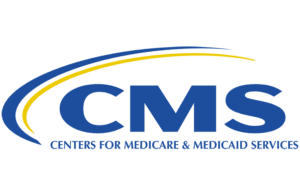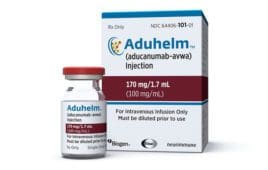
[Image courtesy of CMS]
In April 2022, CMS decided to limit coverage of such antibodies for Alzheimer’s to clinical trial volunteers. At that time, aducanumab from Biogen (Nasdaq: BIIB) and Eisai (TYO:4523) was the only FDA-approved antibody for the neurodegenerative condition.
CMS noted in an announcement that its latest decision rests on the current lack of evidence that amyloid-targeting antibodies are effective against Alzheimer’s.
Amyloid-targeting antibodies intend to treat Alzheimer’s by targeting and removing amyloid beta, a protein that accumulates in Alzheimer’s patients’ brains. The protein deposits eventually result in plaques that interfere with normal brain function.
Alzheimer’s organizations upset with the CMS
Alzheimer’s Association president and CEO Joanne Pike lambasted the decision, saying it is not CMS’s role to “stand between a patient and a doctor when deciding what FDA-approved treatments are appropriate.”
“Their role is not to single out people living with Alzheimer’s and decide that their lives, their independence and their memories are not necessary,” she continued.
Global Alzheimer’s Platform Foundation President John Dwyer criticized the decision, categorizing CMS’s decision as “outrageous.” He said the agency has “discriminated against 1.2 million Americans with Alzheimer’s who can benefit from a class of disease-modifying therapies that can help extend their life, memory and independence.”
Another advocacy organization, Voices of Alzheimer’s, also criticized the decision. “We believe that CMS is standing by the decision to deny medically necessary care because they want to control costs,” noted Jim Taylor, the organization’s president and CEO.
Efficacy and money questions
Assessing the efficacy of monoclonal antibodies targeting amyloid remains a thorny subject. In 2021, several FDA advisory committee members resigned after the agency conditionally approved aducanumab. One described the approval as the “worst” in recent U.S. history.
Biogen initially priced aducanumab at roughly $56,000 per year. An internal document from the company suggested that the company hoped aducanumab’s debut would be “one of the top pharmaceutical launches of all time,” according to The New Yorker. Biogen later cut the price in half.
Eisai said it would charge $26,500 per year for lecanemab.
Lecanemab could prove to be more effective than aducanumab. In an 18-month study in patients with early Alzheimer’s, it slowed the rate of cognitive decline by 27%.
The agency notes that it seeks to help improve care for Alzheimer’s patients. It states that it will expeditiously review new evidence that could convince it to reconsider the national coverage determinations for amyloid-targeting antibodies for Alzheimer’s.
To date, aducanumab and another antibody, lecanemab, have received accelerated FDA approval. CMS notes that it would provide broader coverage to the antibody class if an Alzheimer’s disease treatment wins traditional FDA approval.
Eisai anticipates that FDA will grant traditional approval to lecanemab, whose tradename is Leqembi, this summer.
Filed Under: Neurological Disease



